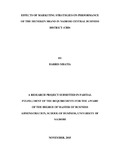| dc.description.abstract | The development of marketing strategy is necessary for success not only in developed markets which have extreme competition and with the players attempting to gain market share, but also the emerging markets where the elements of product, price, promotion and distribution are recognized as valuable sources for competitive advantage. The greatest challenges facing marketers in today’s changing business environment is the development of the decisive strategic thinking and analytical skills required to adapt swiftly and effectively to the environmental and market changes. Selecting strategies for fast changing markets begin with the identification and evaluation of potential market changes and the strategy implications. Emerging from this process should be a strategic vision for the future. Marketing strategies includes all basic, short-term, and long-term activities in the field of marketing that deal with the analysis of the strategic initial situation of a company and the formulation, evaluation and selection of market-oriented strategies and therefore contribute to the goals of the company and its marketing objectives. The study will be guided by two theories i.e. the resource based theory and the theory of planned behaviour. The study used a descriptive cross sectional survey research design. A cross sectional survey was undertaken in order to ascertain and be able to describe the characteristics of the variable of interest in the study. The population of interest was outlets selling premium beer within Nairobi CBD. The estimated number of outlets selling premium beer in Nairobi CBD is 258 outlets. The cluster sampling survey method was used in this study. There were four clusters based on geographic location of the outlets namely: North, South, East and West of the Tom Mboya monument on Moi Avenue. The researcher randomly selected 15 outlets from the cluster. Data was collected using a semi structured questionnaire. The respondents were outlet managers within Nairobi CBD. Data was analyzed using SPSS. Findings show that the most of the respondents were managers from all the outlets that the researcher visited for data collection. The study found out that majority of the respondents had at least a secondary education and hence understood the information sought by this study. The level of education is very significant in contributing to differences in the responses given by the respondents. The study concluded that most of the respondents have worked between 0-5 years in their respective outlets. The findings indicate that the majority of these organizations have been operating for long enough to understand the effects of marketing strategies on performance of the Heineken Brand. The results indicates that most of the beer selling organizations in Nairobi Central Business District are limited companies. The findings indicates that all the respondents represented by 100% indicated that they sell all the brands provided by the researcher. The findings indicate that performance of Heineken in Nairobi CBD is affected by rebates, digital space management, online campaigns and public relations to a greater extent. Sale promotion, reliability and availability of the product also affects its performance but to a small extent. The findings of the study indicate that the most of the organizations enjoy less level of market competitive advantage. Findings indicate that the majority of the organizations have less market share. From the findings, the market share attribute to marketing strategies is less than 5% in many organizations. Findings indicate that the highest percentage will attribute less than 5% of their annual gross profits to implementation of marketing strategies implemented by Heineken. | en_US |

